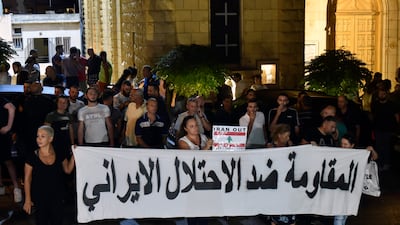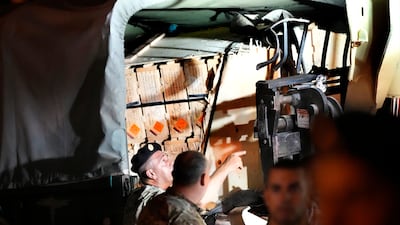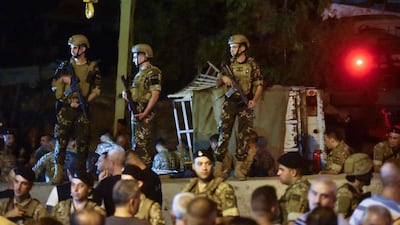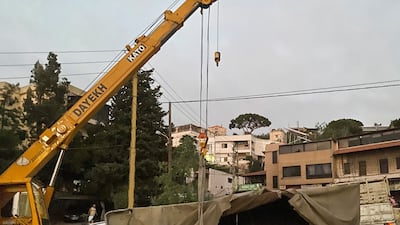The death in southern Lebanon of a local official from the Lebanese Forces, parliament’s largest political party, has led to the opening of a security forces investigation during heightened tension in the country.
Elias Hasrouni, 72, was a co-ordinator for the LF in the Bint Jbeil region and a resident of Ain Ebel, a village only a few kilometres from the UN-patrolled Blue Line that separates Lebanon and Israel.
Mr Hasrouni was found dead in his car by local villagers last Wednesday. He had a head injury and it appeared that he had a car accident.
But this narrative was not accepted by the LF and some family members and associates.
“The car didn’t look like it had had an accident,” an LF source told The National.
Friends and family then went around the area asking locals if anyone had any cameras installed that could have shed light on what happened. Earlier this week, they had a breakthrough.
“They found footage showing that his car was obstructed by a convoy of SUVs,” the source said, adding that they were armed. His car appears to then have been escorted away.
After the information was shared with security officials, the LF source said Mr Hasrouni’s buried body was dug up.
The autopsy showed that he had been beaten with a pistol and strangled.
A security source confirmed to The National that an investigation has been launched, describing it as a “normal step”, without giving further details.
LF leader Samir Geagea released a statement saying that recent developments had “undoubtedly revealed” that the death of Mr Hasrouni “was not the result of an accident”.
“Elias was a victim of an ambush by at least two cars, concealing six to nine persons, who obstructed the passage of Elias and kidnapped him, driving him to another location where they have murdered him,” Mr Geagea said.
“These new evidences are now in the possession of the security agencies, particularly the Lebanese Armed Forces Intelligence Directorate and the Internal Security Forces Information Branch.”
While politics in the deep south is dominated by Shiite groups Amal and Iran-backed armed group Hezbollah, there are Christian areas there too.
The LF put forward a candidate in the region for the 2018 parliamentary elections, but refrained from doing so in last year's legislative poll.
There will be questions over whether Hezbollah – to which the LF is deeply opposed – is responsible, although that is unclear at the moment and fingers are not being publicly pointed at the group.
The powerful and influential group has a history of assassinating its rivals and southern Lebanon is one its main strongholds.
“In this part of Lebanon, people tend to think it is fully Shiite and under the control of Hezbollah. It is not,” the LF source said.
The LF is urging Lebanon’s state and security institutions to take action and prevent any unrest.
The killing comes at a time of particularly heightened intercommunal tension in Lebanon, which is in the middle of an economic crisis and an unprecedented governance vacuum.
On Wednesday night, a Hezbollah lorry carrying ammunition overturned in Kahaleh, a Christian town in the hills overlooking the capital, Beirut.
Hezbollah gunmen escorting the lorry then engaged in a shoot-out with local residents, leading to two deaths – one from each side.
Lebanon has been without a president since Michel Aoun left the palace in Baabda at the end of last October.
In 12 sessions, the deeply divided parliament – where no faction holds a majority – has been unable to agree on a successor.
In the most recent session in June, the main Lebanese Christian parties – as well as some independent MPs – backed Jihad Azour, a former finance minister and regional director at the International Monetary Fund.
Meanwhile, the Shiite groups voted for Suleiman Frangieh, a close friend of Syrian President Bashar Al Assad.
These events come with Prime Minister Najib Mikati’s cabinet operating under caretaker status, and thus severely restricted in its power.









